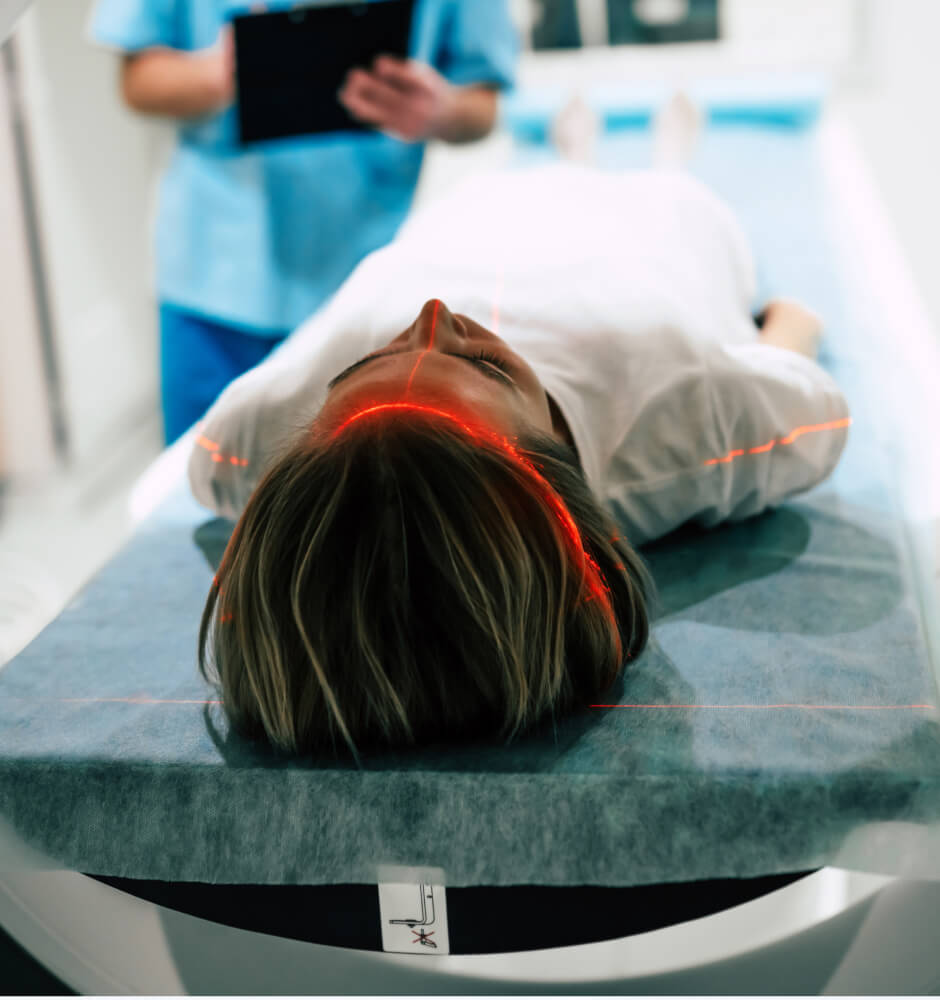What is an MRI?
MRI stands for magnetic resonance imaging. It is a diagnostic test that enables a view inside your body, producing images of your bones, muscles, brain, organs and/or soft tissues.
How does an MRI work?
An MRI uses a powerful magnetic field, combined with radio waves and a sophisticated computer to produce detailed images of anatomy.
Is an MRI safe?
Yes. MRI does not use any ionizing radiation, so it is very safe for patients, including those who may be pregnant or who have received radiation as part of disease treatment.
Are there risks associated with MRIs?
The most important risk is related to metal in or on your body inside the scanner or the scan room. This can include piercings, clothing with metal of any kind, underwire bras, hair accessories, dentures/false teeth/retainers and implanted devices.
How long does an MRI take?
An MRI can be as little as 15 minutes and as long as 90 minutes. This is because imaging certain areas of the body take longer than others. For example, imaging the entire spine will take longer than imaging a small portion of the spine.
Why do I have to lie still in an MRI?
Just as moving your body can blur a photographic image, moving your body during an MRI can create blurred or unusable images. It’s important for you to be relaxed and lie still during your exam… movement can cause additional delays and increase scan time.
Can I have an MRI with piercings?
If the piercings are made from metal, they would be unsafe to have inside the MRI scanner. If piercings are dermal, they may be unsafe if they contain metal that would be attracted to a magnet.
Do tattoos affect MRI results?
In some cases, tattoos that contain metal can make an MRI less comfortable, causing irritation and a “burning” sensation. Such tattoos can also affect the quality of an MRI scan, especially if they are in the same location as the part of the body being scanned.
Can I wear jewelry during an MRI?
Patients should remove all jewelry before entering the scanning room.
What about wigs or hairpieces?
Wigs, hair weaves and extensions will need to be removed before having an MRI to avoid interference, heating and ferromagnetic “pull.”
Can I have an MRI with an IUD?
MRI is generally safe for women with contraceptive implants. Most modern IUDs are considered MRI-safe, however there are IUD some older devices from China and Japan that contain metal that should not be scanned.
Is an MRI painful?
An MRI scan is not painful, however, if you have an injury that is causing you pain when you lie still, the scan may be uncomfortable. Also, having a tattoo containing metallic ink can make an MRI scan uncomfortable.
What is an MRI Arthrogram?
An MRI arthrogram is a series of images of a joint within the body. It involves the injection of a contrast medium and is used for patients with joint pain that cannot be diagnosed with a traditional MRI exam.
What is a “contrast agent” or an “MRI with contrast?”
A contrast agent (gadolinium) is sometimes required to obtain clear images of a specific part of the body. The gadolinium is injected intravenously into the body before an MRI. Some patients have experienced adverse effects after a contrast agent is administered. If you have had a reaction in the past, please inform us.
What is a CT scan?
Also called “computed tomography” is a machine that takes a series of x-ray images while rotating around the patient’s body. A computer reassembles the images into “slices” of patient anatomy so that a radiologist can accurately diagnose a suspected health condition.
Is a CT scan safe?
CT scans use iodizing radiation, but in very low amounts, so it is not harmful to the patient.
Can I have a CT scan if I’m claustrophobic?
Yes. A CT scanner is more “open” than a traditional MRI, so it is unlikely that you will feel confined or anxious while being imaged in the CT scanner.
Is blood work needed for MR and CT contrast exams?
Blood tests measure kidney function and are often required before a scan with intravenous contrast. This test ensures that your kidneys are healthy enough to filter the contrast. The tests are usually blood urea nitrogen and serum creatinine, and you should complete them within 60 days before the exam. We also require glomerular filtration rate (eGFR) levels.












